Popular Reads
Top Results
Can't find what you're looking for?
View all search resultsPopular Reads
Top Results
Can't find what you're looking for?
View all search resultsStrict safeguards key to successful polls during pandemic: South Korean envoy
South Korea’s envoy says the stringent application of health protocol and an effective awareness campaign were key to hosting a successful election during the pandemic, as Indonesia consults with Seoul on how to prepare for simultaneous regional polls in December.
Change text size
Gift Premium Articles
to Anyone
South Korea’s envoy says the stringent application of health protocol and an effective awareness campaign were key to hosting a successful election during the pandemic, as Indonesia consults with Seoul on how to prepare for simultaneous regional polls in December.
In an exclusive video interview with The Jakarta Post this week, Ambassador Kim Chang-beom shared key insight from South Korea’s successful experience of hosting a nationwide legislative poll, one of the first to be held since COVID-19 broke out.
The nation had imposed very stringent safety measures during its elections this year, which included disinfecting all 14,000 polling stations and requiring all voters to wear masks, have their temperature checked, use hand sanitizer and plastic gloves and maintain a safe distance from one another.
“Without that, […] we may not be able to address the lingering fear and doubts of the public as to whether it’s really safe to go to the polling booths,” Kim told the Post on Tuesday.
He insisted that would-be voters must be well informed ahead of time for them to follow the state-led safety measures.
While the envoy noted there was no one-size-fits-all approach for countries in tackling the viral outbreak, he argued that advanced preparations were even more necessary for countries like Indonesia, which are much bigger in size and population, especially in the regions and at the village level.
The Indonesian government announced that regional elections would be held on Dec. 9. The polls, initially scheduled for Sept. 23, would see 270 regional leaders elected, comprising nine governors, 224 regents and 37 mayors.
However, observers have pointed out that the general public was still largely hesitant to head to the polling booths at a time when the prospects of recovering from the COVID-19 epidemic are still uncertain and the risk of infection remains high.
Indonesia’s infection curve still appears to be steep, with the official tally rising to 35,295 confirmed cases and the death toll increasing to 2,000 on Thursday.
The government is in talks with experts and partner countries that have had success in bringing the health crisis under control, including South Korea, with Ambassador Kim saying he had been speaking to Home Minister Tito Karnavian, who oversees regional autonomy and coordination.
South Korea’s legislative election has widely benefited from the government’s swift response to the outbreak, which allowed it to significantly slow the rate of infection in a short span of time.
Observers have pointed out that the largely successful campaign against the virus provided a boon in popularity for President Moon Jae-in and his Democratic Party, which won a three-fifths majority in the legislature, AFP reports.
It also had the added effect of increasing voter turnout, the South Korean envoy argued, with the April 15 elections seeing 66.2 percent of eligible voters cast their ballot, the highest recorded in the country since 1992.
While there were concerns and skepticism in some quarters, there was also a resounding national consensus that South Korea should go ahead with the planned election, Kim said.
“We were pleasantly surprised by this high turnout and also luckily enough we didn't have any new infection cases out of this general election process,” he said in the interview.
The envoy said the pandemic response had made the people feel “more keen about the role of the government and state” and how they could provide safety and a sense of stability to the public.
“In the case of Korea, we’ve been a bit excelling in times of crisis, so that might have made the people [...] feel obliged to go to the polling stations to exercise their right to vote,” Kim said.
South Korea managed to bring its epidemic under control due to extensive testing campaigns and intensive contact tracing.
It had seen a steep spike in the case number just over a month after its first confirmed case on Jan. 20 and became the second-most infected country after China by early March.
However, by the time the April legislative elections were held, the number of recovered patients in the country had already surpassed that of patients in quarantine or isolated treatment.
According to data from the World Health Organization, South Korea recorded a total of 11,947 confirmed cases and 276 deaths as of Thursday.
Indonesia’s General Elections Commission (KPU), in the meantime, has pegged a 77.5 percent voter turnout target for the upcoming elections.
A survey conducted by Jakarta-based pollster Indikator Politik Indonesia recently found that public satisfaction with democracy in general has dropped significantly since the outbreak began in Indonesia.
Only 49.5 percent of respondents said they were quite or very satisfied with the democratic system, compared with 75.6 percent in February, bringing it to the lowest level since 2004.
Besides preparation for the polls themselves, Ambassador Kim pointed to the possible effect that a COVID-19 “new normal” would have on political campaigns ahead of the elections, with the fear of infections leading to less large-scale political gatherings and no more politician hugs and handshakes. He urged the government to discuss arrangements with the political leaders.










